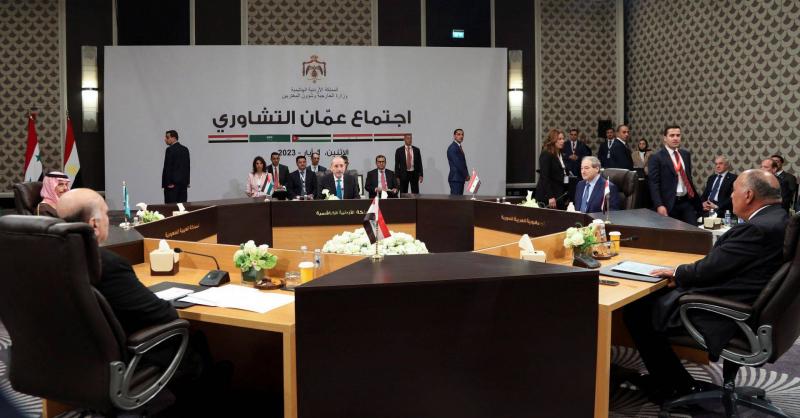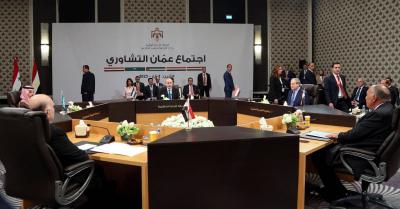Arab countries have reinstated Syrian President Bashar al-Assad to the Arab League after a long period of his exclusion, seeking his cooperation to curb the thriving drug trade in Syria in exchange for strengthening relations. While Damascus has its own demands, moving forward does not appear to be straightforward.
On Sunday, Arab nations closed the chapter on years of confrontation with Assad by allowing Syria to return to the Arab League, a pivotal step toward his regional rehabilitation, despite continued Western rejection following years of civil war.
**Integration Comes with a Price**
Arab leaders are asking for a price for reintegrating Syria, particularly the cessation of Captagon production and smuggling, which Western and Arab countries claim is exported from Syria throughout the region. The return of millions of refugees who fled Syria has compounded the officials' concerns, paralleling their worries over Iran's entrenchment in the Arab state.
Damascus denies any involvement in this trade, which has subjected Syrian officials and relatives of Assad to Western sanctions, and seeks to use this issue as leverage.
In a heated meeting on May 1 in Jordan, Syrian Foreign Minister Faisal al-Miqdad told his Arab counterparts that progress in curbing the Captagon trade hinges on Arab pressure on the United States to lift sanctions, according to three sources familiar with the meeting. He linked the return of refugees and securing funding for Syria's reconstruction, from which over five million people have fled during a war that has claimed hundreds of thousands of lives. One source revealed that the meeting was "intensely heated,” and the Arab ministers expressed discomfort with Miqdad's tone.
The meeting, attended by ministers from Egypt, Iraq, Saudi Arabia, and Jordan, issued a statement in which Syria agreed to assist in preventing drug smuggling and to work over the next month to identify its producers and traffickers.
**Jordan: Drugs Threaten Our National Security**
Highlighting the severe Arab concern regarding this issue, local and intelligence sources revealed to Reuters that Jordan conducted airstrikes in Syria on Monday, resulting in the death of a Syrian drug smuggler named Marai al-Ruthman and damaging a factory linked to the Lebanese Hezbollah group. Hezbollah, which deployed fighters in Syria to support Assad's war efforts, denied any involvement in the drug trade.
Captagon has been a lucrative part of Syria's wartime economy, estimated to be worth billions of dollars annually. A senior Jordanian official stated that Jordan informed Syria that it considers drugs a threat to its national security, deeming "the pressure on the borders immense; these are not mere gangs," expressing the belief that these groups are supported by Iran and fortified within the state.
With assistance from Iran and Russia, Assad has been able to "defeat" his enemies, some of whom received backing from certain Arab states allied with the United States that have now resumed relations with him. Among these is Saudi Arabia, which is also working to repair relations with Iran, Assad's ally.
**Saudi Arabia to Compensate Syria?**
A regional source close to Damascus and a Syrian source familiar with Gulf communications stated that Saudi Arabia proposed compensating Syria for trade losses in the event of a cessation. The regional source revealed that Saudi Arabia offered four billion dollars based on Riyadh's estimates of the trade's value, and that the proposal was presented by Saudi Foreign Minister Prince Faisal bin Farhan during his visit to Damascus, adding that "the funds would be presented as agricultural aid."
The Syrian source confirmed that Riyadh proposed to pay a sum as humanitarian assistance, but did not specify the amount. An Arab Gulf diplomat noted that Syria must stop exporting drugs and is aware that the Gulf is ready to invest if Syria shows indications of compliance.
Two Western sources familiar with Arab communications with Syria indicated that "compensation is necessary to dissuade state-affiliated armed factions from participating in the Captagon trade." Mohannad Haj Ali from the Carnegie Middle East Center stated that Assad's "urgent" need for external aid will shape cooperation regarding both refugees and Captagon. However, he warned that the regime's capacity to achieve results is "limited, just as its sovereignty is now shared among various actors," including Russia, Iran, and local paramilitary groups.
The United States, United Kingdom, and European Union have imposed new sanctions on Damascus in recent weeks due to Captagon. They specifically accuse Maher al-Assad, Bashar's brother and head of the Fourth Division of the army, of facilitating Captagon production and trafficking. The United States has stated it will not normalize relations with Assad and that its sanctions will remain in effect.




